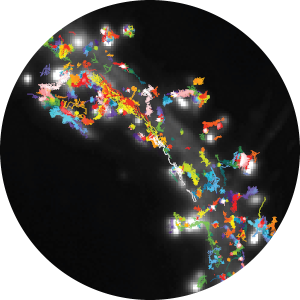
Daniel Hunter. Physiopathological regulation of single NMDA receptor dynamics in psychosis
Motivation
Psychotic disorders, encompassing schizophrenia and bipolar disorders, are major health problems worldwide. It is well-established that several converging factors are involved in these complex psychiatric disorders, among which immune status, including autoimmunity, are particularly relevant. A role for autoimmune dysfunction in psychiatric disorders, reported in schizophrenia almost a century ago, is supported by specific autoimmune responses to self-antigens identified in particular in psychotic disorder. The importance of autoimmunity in major psychosis has been strongly reinforced as a number of syndromes characterized by global encephalopathy and by more focal psychiatric symptoms was found to result from autoimmune dysfunction, caused by anti-neuronal antibodies that alter synaptic transmission, such as NMDAR-Ab in encephalitis.
Research Challenge
To further explore the role of the autoimmunity against neuronal receptor targets in the pathogenesis of psychotic disorders and offer new therapeutic strategies, we must unravel the molecular mechanisms underlying psychosis, which requires multidisciplinary in-depth investigation. We identified that almost 20% of patients diagnosed with schizophrenia are seropositive for the above referred autoantibodies, opening therapeutical options for these patients. The goal of this ambitious PhD project is to uncover how human NMDAR-Ab underlies psychosis, using a combination of experimental approaches with in vitro, ex vivo and in vivo neuronal preparations.
The group led by Dr. Laurent Groc at the Interdisciplinary Institute for Neuroscience (IINS), University of Bordeaux has an excellent track record in studying the cellular and molecular mechanisms underlying the maturation of glutamate synapses in physiology and neuropsychiatric conditions, NMDA-type glutamate receptors (NMDAR) being central players in synaptic plasticity.
Supervision and Secondments
The PhD project will be carried out in Groc’s Development and Adaptation of Neuronal Circuits group at IINS. The ESR will enrol in the Life & Health Science Doctorate School of the University of Bordeaux. The project also features secondments (extended stays) at CNC (Ana Luísa Carvalho) and Lundbeck (Kjartan Herrik).
Supervisor: Laurent Groc (laurent.groc@u-bordeaux.fr)
Host Location: Interdisciplinary Institute for Neuroscience (IINS) – CNRS, Bordeaux University, Bordeaux, France.
< return to list of projects
